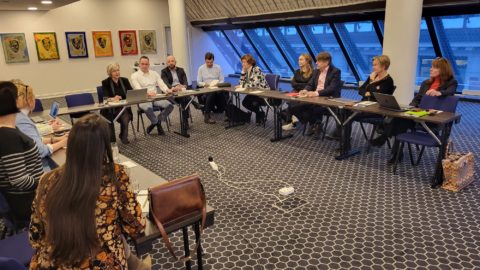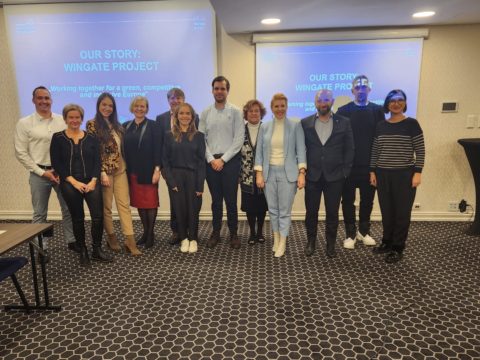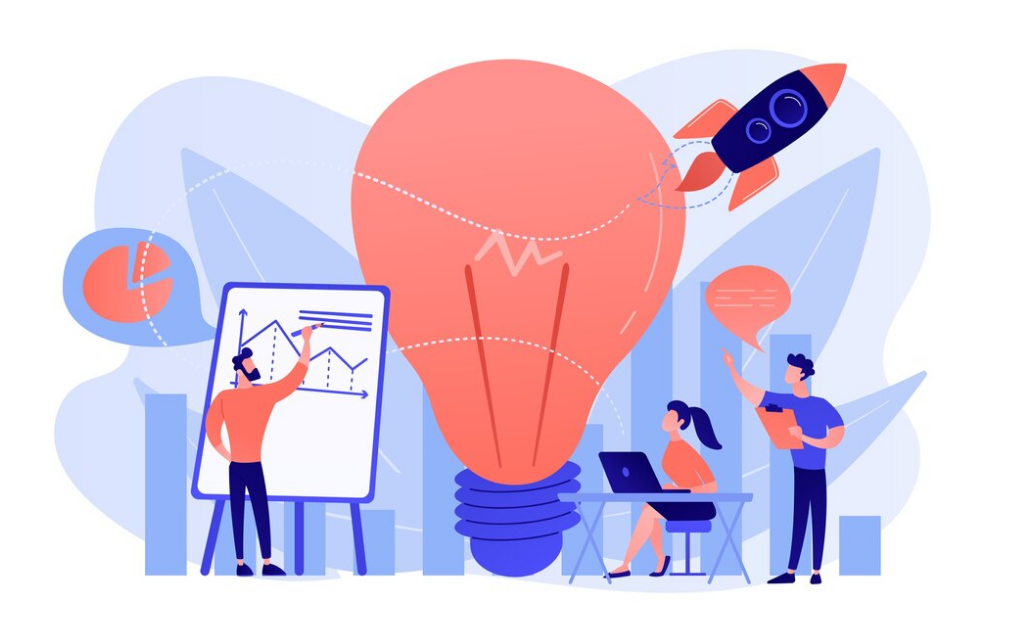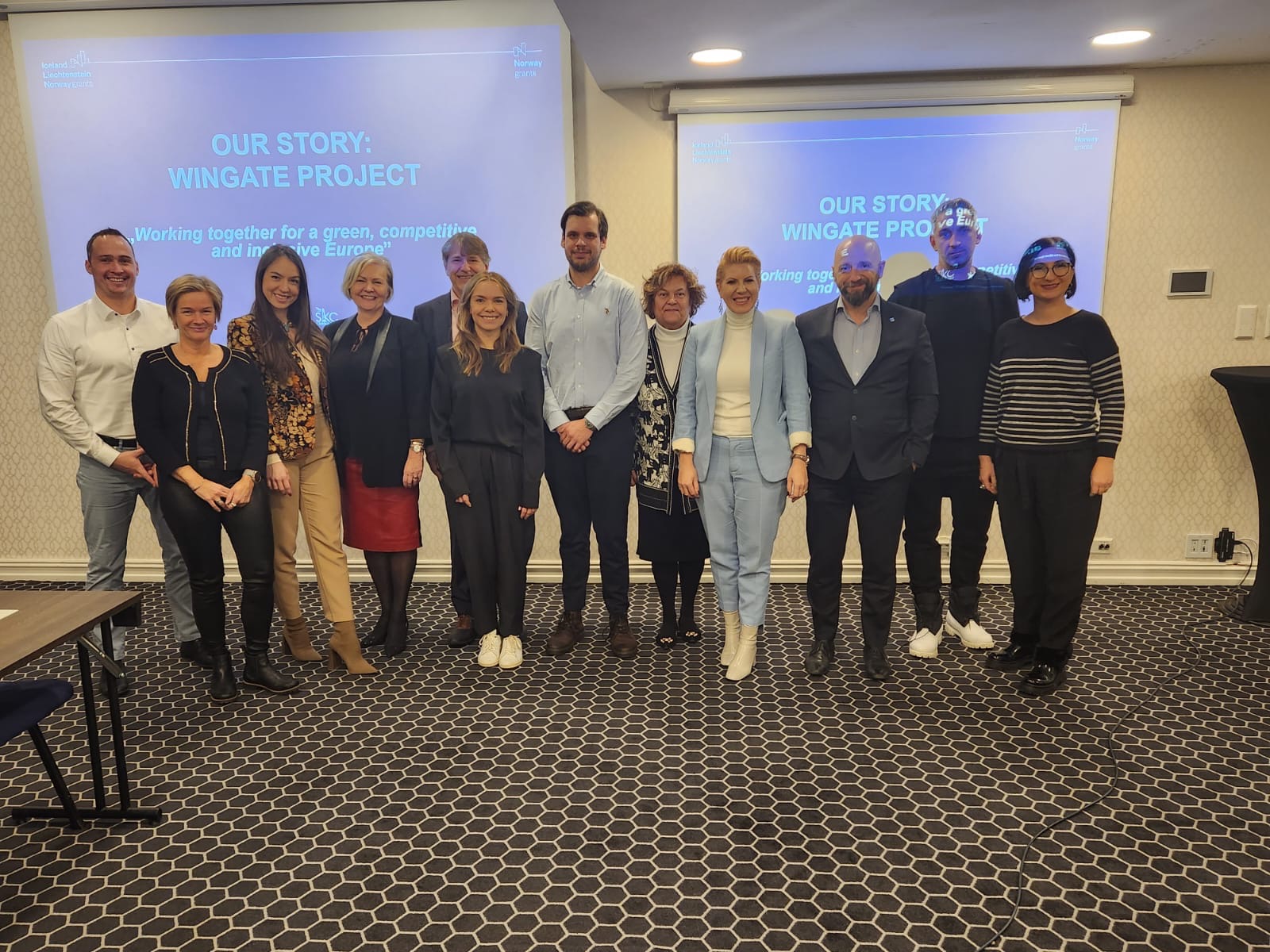Article from my perspective: Wingate project, oh, what a ride it has been!
Article by Andela Urosevic, Serbia
I can't help but feel overjoyed about the recent surge in registrations on our e-platform, especially from Serbia. Seeing over 400 new sign-ups and a whopping 200,000 visits from our own country, with 70,000 folks diving into educational courses, is just mind-blowing. It's like watching our hard work come to life right before our eyes!
But you know what's even more incredible? It's seeing how women in Serbia are stepping up with this newfound courage to chase their entrepreneurial dreams. I swear, there's this amazing shift happening, and it's all thanks to the work we've been doing.
I remember how it all started... from crafting that very first questionnaire to spreading the word through every possible channel, it feels like we've been on this wild journey together. Those meet-ups, conferences, and educational sessions have been the heartbeat of our community nurturing budding women entrepreneurs every step of the way.
Let's not forget the Belgrade Venture Forum events, both on- and offline. Those were something else, especially since we were in this together with all the partners from the team. It's been a real inspiration working with all of you during these days.
But it's not just about the big events. It's the little victories too, like the Female Leadership Summit and our awesome collaborations with organizations like NALED. Each win, each success story – they're all pieces of this beautiful puzzle we've been building together.
As I recall this whole journey now, collecting these thoughts, I can't help but feel a sense of pride wash over me. Our passion-fueled teamwork has paid off big time. And while this chapter of the Wingate project might be winding down, I've got this gut feeling that it's just the beginning of something even more incredible.
So, here's to us – to all the meetings, the brainstorming sessions, and the victories, big and small. We've not only created projects but also sparked a wave of empowerment and change. And you know what? I can't wait to see what we'll conquer next. Cheers to the future – it's bound to be one heck of a ride!
The role of Business Angel Investors in restart and resilience of post-Covid business life and economy
1. The first lesson – organizational level
When the WINGATE project was awarded by the EEA and Norway Grants Fund for Regional Cooperation
mid-April 2020, Europe was just about a month into the chaos, sudden despair, tragic human and
personal loss, paralysed regions and countries caused by the outbreak of the COVID-19 pandemic. News
were all about lockdowns, PPE and hazmat suits, horrifying hospital situations and desperate small
businesses questioning their future fates in almost all industries.
At those times it seemed impossible to realise a successful project that builds on human relations,
trainings, mentoring, networking and international collaboration. We were all trying to manage daily life
when not only the tech-savvy but each every one of us had to suddenly learn to operate parallel online
video calls, web-based collaboration platforms, while we also ordered groceries and food online – so the
delivery service rings the bell just in time when the kids have a lunchbreak in their homeschooling
agenda.
The challenges were great and there were tragic losses. But as step by step, week by week, month by
month we learnt to live together with the pandemic, we also had the chance to learn something
wonderful: that based on 21 st century technology, we can be closer than ever before. Project meetings
online can take place every week, speeding up our work, compared to the pre-pandemic once-in-a-
couple-of-months personal trips that tired all participants and were unfavourable for the environment
as well. Certain trainings, discussions, conferences can be held online, which does not only open up the
opportunity to tackle the lockdowns but also allows us to invite speakers from all around the globe, and
participants joining our discussions from so many various countries.
Women/Business/Angels Association spent the first half of the WINGATE project trying to learn that
lesson and better it as much as possible. As most of our discussions and content already had English as a
working language, we organised a hybrid international forum in October 2020, an online training test
series in the first half of 2021 and two further hybrid international fora in June and November 2021. We
invited speakers from Norway, Poland, France and several other countries, and we were able to present
the project, present ourselves and the Hungarian innovation ecosystem for so many domestic and
foreign participants at our events.
As time passed and restrictions loosened, we got used to it, we organised hybrid events while we were
working out and testing the training materials designed for the WINGATE project. We knew our project
partners much better by voice than by face (as often due to narrowband internet connections we turned
off cameras during our videocalls) and worked together towards our common goal, but from different
corners of Europe.
2022 has brought a change to our work. As the pandemic seemed to be tamed by the brilliant inventions
of COVID-19 jabs (with enormous efforts included from female scientists and experts) travel, especially
international travel became more manageable and we had a set of lovely consortium meetings, where –
as it turned out – it was also invigorating to meet in person, have small chats, a coffee, a dinner together and allow ideas to spread and grow apart and beyond the core project targets. We made and renewed the human connections and strengthened the collaboration among the partnership. We also reached out to actors, entrepreneurs, business angel investors and policy stakeholders on the personal level aswell, making good use of the opportunities to bring people together, building bridges and networks that can be built into the project and – next to the actual and factual Knowledge Base presented on the online portal – can also result in tacit knowledge and networking capital for the participants. We strongly hope that the WINGATE project has profited from this experience as much as we, Women/Business/Angels have done, and the benefits are transferred to our target groups, our networks of women entrepreneurs and business angel investors in our national and (Central) European innovation ecosystems.
2. The second lesson – business level
The WINGATE project’s consortium is composed of several different partners, each bringing in their own
knowledge, network, stakeholder groups to the common table. Women/Business/Angel has been
responsible for the training series development related to women business angel investors and
preparing as well as testing those trainings, spreading the news, inviting more and more actors and
stakeholders has been our main target throughout project realisation.
One key part of the lessons we learnt was that business angel investors are almost fictional characters in
the eyes of a common entrepreneur. The concept is not well defined and understood, while they are
rare, seldomly seen, more of an urban legend than reality. We aimed to find the reasons and mitigate
the situation by starting our training sessions and contents with explaining the basics and inviting real-
life investors as special guests to our events to help the audience become better acquainted with the
concept and the people as well.
First, in scientific literature there is a significant difference between small business owners and
startuppers – the first are people who set up a legitimate business that caters local demand and
provides breadwinning opportunity to the entrepreneur as well as his/her employees. The second group
are startuppers, who – from day 1 – aim to build a born-global business, well-profitable on the long run
for the founders, scalable - and therefore in most cases IT based. Both types of enterprises are useful
and have their place in the economic landscape, but only the second group is tantalizing enough for
business angel investors (and maybe later on, for venture capitalists) to invest in.
The COVID-19 pandemic had changed the rules of the game for both groups and may also have blurred
the strict line between the two. For small business owners, many were operating in endangered sectors
(tourism, hospitability, etc) and were forced into a situation where they needed to innovate beyond
their comfort zone in order to survive. Many previous employees have lost their jobs and have found
themselves in the shoes of an entrepreneur-to-be. Everyone had picked up very fast the new IT skills
that were needed to work from home, even from remote locations. Physical location was suddenly
much less important, relevant IT technologies were available and used in a much wider circle, therefore
both the global market and scalability became within reach for many who were previously just planning
to open up a small business. This blurring of the line between small businesses and startups have further
been enhanced by the growing up of the born-digital post-millennial generations.
As economic perspectives darkened with the pandemic, investors run ahead – and looked for every idea
that may be interesting to be picked up, financed, supported and they were encouraged by the
significant amount of recovery funds allocated by the various national governments as well as by the EU
for revitalising economy.
This unique composition of new actors in the innovation ecosystem has made the WINGATE project
even more important than as planned years before at the time of proposal formulation. The first steps
to be taken as an entrepreneur, the mature guidance to entrepreneurs planning to grow and the
introduction of business angel investors into the picture was just at the right place at the right time in
order to add its inputs supporting these businesses not only to survive but to be reformed, re-thought,
adapted to new, post-Covid business practices and become more resilient.
Our network of entrepreneurs and potential business angels have confirmed that our discussions,
trainings and networking have helped them take the necessary steps forward, and we hope the project
contributed to the rebuilding of businesses and supporting female entrepreneurs/investors in our
regions.
3. The third lesson – economy-level
Women's empowerment and gender equality are critical to economic development. The United Nations
confirmed that women’s economic equality is good for business as it fuels economies, benefiting
everyone 1 . Women entrepreneurs can make substantial contributions to innovation, job creation, and
economic growth.
A Boston Consulting Group study found that businesses founded by women delivered higher
revenue—more than twice as much per dollar invested—than those founded by men, making women-
owned companies better investments for financial backers 2 . Nevertheless, female entrepreneurs still
face considerable challenges, including lower access to finance. According to a report by the European
Institute for Gender Equality, in 2018, women-led businesses represented only around 30% of all
entrepreneurs in the European Union 3 .
Angel investors play a crucial role in the entrepreneurial ecosystem by providing much-needed early-
stage capital. However, the gender disparity in this field is striking. A 2020 report by the British Business
Bank indicated that for every £1 of venture capital investment in the UK, all-female founder teams
received less than 1 pence 4 . Given that women-led startups perform as well, if not better, than those led
by men, increasing the number of women angel investors would not only advance gender equality but
also drive better returns and foster innovation.
The COVID-19 crisis has disproportionately affected women, yet it also offers an opportunity for a
gender-responsive recovery. A research conducted in the iFEMpower project has found that 63% of
female entrepreneurs spent less time on their business during the quarantine period, on average they
spent almost 2 hours less on their business on a usual weekday and spent 2 hours more on caring
responsibilities. 5 Yet, the European Institute for Gender Equality highlighted that investing in the care
economy, digitalization, and green economy, where women are prominently engaged, can be key for
Europe's economic revival post-COVID-19.
In order to support the strengthening of existing women-led businesses, to increase their adaptability
and resilience, more targeted efforts are needed to support women entrepreneurs, such as dedicated
funding, mentorship programs, and gender-inclusive policies, could help tap into the full potential of
women's entrepreneurship in Central Europe and across the continent.
In conclusion, increasing the role of women in the economy and society can yield substantial economic,
societal, and environmental benefits. Women's entrepreneurship and involvement in angel investing
should be encouraged and supported, particularly in the post-COVID recovery period and in regions like
Central Europe where the potential for growth is significant. Economic growth must be fueled by all the
power our engine has, and that includes a fair share of women’s capacities and potential as well.
4. Post scriptum
...And towards the end of the third year of WINGATE, when we realised that the project is almost over,
we wished if it could continute, to be able to reap the benefits of the efforts, to see all ends to meet,
entrepreneurs and angels collaborating towards a greater good. And our wishes became true, one more
semester was added to our joint activities. Our final event on 8 November 2023, represented what we
stand for: women entrepreneurs, business angels and impact managers collaborated in discussing how
to create more impact-generating, social innovation based enterprises that benefits us all.
The closing of the WINGATE-project
The partners from Hungary, Moldova, Romania, Serbia and expert partner Norway were gathered in Oslo the 15 th of December for the closing event with special guests from Innovasjon Norge, the Ministry of Foreign Affairs and the Ministry of Hungary. Despite differences, partners have established a common WINGATE culture and a strong relationship based on mutual understanding and respect. Learnings through WINGATE also include friendships across borders and culture learning.

The closing meeting in Oslo was inspiring
5000 people have participated in events
During the three- and half-year project period, thousands of female entrepreneurs have received support and empowerment through the project. Even though the launch of. WINGATE was at the beginning of the pandemic, and later the war in Ukraine, the results are
really strong.
Some overall results for the project:
- Survey, 2021
More than 1400 women from the four countries answered the WINGATE survey with questions regarding hard and soft skills.
- Events, 2021-2023:
In total more than 70 events, with approximately 5000 participants.
- Trainings, 2022:
The five countries in the project have developed approximately 110 trainings dived intothree areas: 1) How to start Your Business, 2) How to Grow your Business and 3) Business Angels. All the trainings are available on the E-platform.
- E-platform, 2022-ytd
The e-platform is on the webpage - https://wingateproject.com/. All users have free access to all the materials, when they register.
Closing time and round the table discussion
Innovasjon Norge and the Ministry of Foreign Affairs Norway presented the different funds and schemes outlining future possibilities for projects like WINGATE. The partners found this very useful and inspiring and even though one door is closing, new doors can open. Norway has been an expert partner in the project, supporting the other countries. But in our opinion all partners have been experts, sharing knowledge, cultures and learnings. We have all a common mission; fighting for and strengthening women’s rights and counteract inequality. An era is closing, but the objective, the mission of supporting female entrepreneurs and the partnership lives on.
About the Wingate Project
The Wingate project is a collaboration between partners from Hungary, Romania, Serbia, Moldova and Norway. The goal is to create a green, competitive and inclusive entrepreneurial community in central and eastern Europe with guidance and networking for women who want to establish theirown business or become investors. The project is financially supported via an EEA grant of €1,824,320 from Iceland, Liechtenstein and Norway through the "EEA and Norway Grants Fund for Regional Cooperation. From Kvinner in Business, Toril Flåskjer, Marit Silseth and Lotte Frost are associated with the project.
- For more information about the project, click here.

Partners and Innovasjon Norge all agreed that the project is of great importance.
Reflecting on WINGATE’s Legacy – thoughts of the Leading Partner
As the lead partner of the WINGATE project, we at SKC-Consulting Ltd. are filled with a mix of pride
and nostalgia as we approach the conclusion of a journey that has reshaped the landscape for women
entrepreneurs in innovation. Supported by a substantial grant from the EEA and Norwegian Grants
Fund for Regional Cooperation, we embarked on a mission in 2020 that would take us through the
challenges and triumphs of empowering women-led enterprises across Hungary, Moldova, Norway,
Serbia, and Romania.
Our collective goal was crystal clear: to ratchet up the number of successful women enterprises,
especially in the fast-evolving innovation sectors, and to level the playing field when it came to their
competitiveness and opportunities. The digital transformation of the global economy was not just a
backdrop but a springboard for our endeavor. We saw a unique chance for the Central-Eastern
European region to bridge the gap and introduce a new, invigorating approach to female
entrepreneurship and investment.
The cross-country collaboration at the heart of WINGATE has been nothing short of inspirational. Each
partner brought their A-game, sharing knowledge and best practices to forge a methodology that has
ignited a new wave of female entrepreneurs and shrewd angel investors. It's been an exhilarating ride,
offering both online and offline training, fostering community spirit, and delivering digital solutions that
have truly revolutionized the go-to-market strategy for our beneficiaries.
During the project's lifespan, we hit the ground running with 60 training sessions that spanned across
our five partner countries. These events were tailored to spark innovation and fuel the entrepreneurial
fire within our participants, whether they were joining us in person or logging in from afar. Each session
was a stepping stone towards building a more inclusive, financially accessible, and competitive
environment for women-led businesses.
As we reflect on WINGATE's impact, it's remarkable to see the transformation in the innovation sector.
Women's engagement in cutting-edge industries has soared, and their businesses have climbed the
competitive ladder. Beyond the numbers and the success stories, it's the shift in mindset that stands as
the true hallmark of our project. Decision-makers are now more attuned to the needs of women
entrepreneurs, and stakeholders are actively participating in the development of women-led
enterprises.
The sustainability of our efforts is encapsulated in the WINGATE digital platform—a regional knowledge
E-Platfrom's redefined how local, often isolated companies engage towards internationalization.
This platform is designed to endure, attracting new users and investors long after the project's
conclusion.
Though the WINGATE project in its current form has reached its end, the journey is far from over. We,
the partners, are unanimous in our decision to continue the momentum we've built. The e-platform,
which stands as a testament to our collaborative efforts, will see ongoing development and
enhancement. We remain on the lookout for fresh opportunities to expand our reach, improve our
services, and create new pathways for success for women entrepreneurs. The spirit of WINGATE will
live on, as we carry the torch of innovation, empowerment, and community into the future. Together, we
move forward with the shared conviction that our work is vital and must continue to evolve, just like the
dynamic and ever-changing world of entrepreneurship we serve.
Here's to the future — a future where the accomplishments of WINGATE are just the starting point for a
world of opportunities for women entrepreneurs and innovators everywhere.
Wingate leaves behind a united community, focused on continuous education as a pillar for the sustainable development of Romania and Moldova.
To assume risks and act swiftly, but to surround oneself with the right partners and employees, in whom to trust and respect. It will be an exercise rewarded through reciprocity. Invest time and energy in building relationships with professionals in the field, attend conferences, and join professional organizations. Engage in constant networking, seek sources of investment for the businesses they lead, but above all, think big, beyond boundaries of time, country, and mentalities! Discover and contribute to building a community as the sole solution for a better society! This is what 2500 businesswomen have learned over a project spanning 3 years, and its echoes will reach several thousand more members of families, employees, friends, and partners.
As part of the Wingate project, hosted by ANAA, more than 40 events were organized in Romania and Moldova, covering a geographically diverse area, both in terms of local entrepreneurial profile and economic development. Large cities with entrepreneurial tradition, strong communities, as well as those in the early stages, gravitated around positive, universal values.
Romania, a Latin country with a profound respect for the input that women have in education, has a distinct characteristic: companies with 100% female ownership have an average profit rate almost double that of those with 100% male ownership. In the entrepreneurial environment of Romania, women hold shares in 47% of active companies with a turnover exceeding 10,000 lei, almost at parity with men. Moreover, one in four companies is 100% owned by women. Although they represent almost half of the active companies in Romania, the total turnover of female-owned companies was 82 billion euros in 2021, accounting for only 21% of the total reported revenues. What Wingate implemented in the consciousness of participating women was the COURAGE to expand their field of interest, the scope of their activities, and the knowledge of specific tools for business scaling.
These events had two important components to offer the target group: valuable information through the training provided by invited trainers, contributing to the development and growth of businesses, and an excellent networking platform where businesswomen from various fields could interact directly to establish potential business collaborations. Session themes included Business Digitalization, Taxation, Communication in Business, the Importance of Networking in Business Growth, and GDPR Regulation in Business. But above all, what the Romanian entrepreneurial environment has learned is courage, inspiration, and the value of continuous education.
Wingate was perceived locally as a universal, significant project, synchronized with the needs of the current times, a business catalyst created to endure! Wingate demonstrated its strength to coagulate, to lay the foundations of a gender community, well anchored in business reality, with vision, elegance and a lot of motivation for success.
Through the WINGATE project, we promote women who want to become entrepreneurs, who want to to explore and develop their skills and abilities in order to help them reach their objectives wingateproject.com
Join the WINGATE community by accessing free trainings, do networking and learn from other success stories and get inspired https://wingateproject.com/e-platform/
Wingate's main objective is to increase the number of women-led enterprises and aims to support women entrepreneurs to achieve equal opportunities and competitiveness in entrepreneurship, especially in innovative fields. The project creates the framework of an international partnership in the Central and Eastern European region between Norway, Hungary, Romania, Republic of Moldova and Serbia, ANAA representing Romania and Moldova, as a vehicle for implementation, dissemination and growth.
The Wingate project is funded by Iceland, Liechtenstein and Norway through the EEA- Norway Grant Fund for Regional Cooperation.




